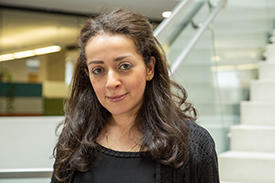In This Story
Amira Roess, professor in the College’s Department of Global and Community Health, says that while several Middle Eastern countries had preparedness plans in place prior to the COVID-19 pandemic, the region’s response shows that the implementation plans remain underdeveloped and under-resourced.

In “How Can the Middle East Better Prepare for the Pandemics of the Future?”, Roess notes that while the COVID-19 pandemic highlighted the global economic toll of emerging highly infectious pathogens, it has not yet resulted in long-lasting or meaningful investments in public health systems. She advocates for significant investments over the next five years in the region’s public health system workforce and strategic technological enhancements.
“Without thoughtful, long-term investment in public health preparedness, the mistakes of the past will be repeated,” Roess writes.
Roess’s piece is a chapter in Thinking MENA Futures from the Middle East Institute’s Strategic Foresight Initiative. The publication maps out possible futures for the Middle East and North Africa (MENA) region by drawing insight on key issues and trends from experts. The publication covers everything from economic development and the future of work to climate change adaptation and public health.
Roess is a nonresident scholar at the Middle East Institute, a nonpartisan think tank providing insight and policy analysis on matters in the Middle East. Thinking MENA Futures is available on the institute’s website.
